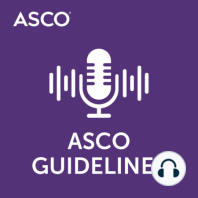12 min listen

Therapy for Stage IV NSCLC Without Driver Alterations: ASCO Living Guideline Update 2022.2 Part 1
FromASCO Guidelines
Therapy for Stage IV NSCLC Without Driver Alterations: ASCO Living Guideline Update 2022.2 Part 1
FromASCO Guidelines
ratings:
Length:
8 minutes
Released:
Dec 19, 2022
Format:
Podcast episode
Description
Dr. Dwight Owen presents the first update to the ASCO living guideline on stage IV NSCLC without driver alterations. He reviews the new evidence identified by the panel along with the updated recommendation regarding the role of bevacizumab in pemetrexed maintenance therapy. Dr. Owen also discusses exciting trials the panel is looking forward to seeing results of to drive future updates to the living guidelines. Read the update, “Therapy for Stage IV Non–Small-Cell Lung Cancer Without Driver Alterations: ASCO Living Guideline, Version 2022.2“ and view all recommendations at www.asco.org/living-guidelines. Listen to Part 2 for recommendations for patients with stage IV NSCLC with driver alterations. TRANSCRIPT Brittany Harvey: Hello, and welcome to the ASCO Guidelines podcast series, brought to you by the ASCO Podcast Network; a collection of nine programs covering a range of educational and scientific content and offering enriching insight into the world of cancer care. You can find all the shows, including this one, at: asco.org/podcasts. My name is Brittany Harvey, and today I'm interviewing Dr. Dwight Owen, from Ohio State University in Columbus, Ohio, lead author on, 'Therapy for Stage IV Non-Small-Cell Lung Cancer Without Driver Alterations: ASCO Living Guideline, version 2022.2.' Thank you for being here, Dr. Owen. Dr. Dwight Owen: Thanks very much, Brittany, for having me. Brittany Harvey: First, I'd like to note the ASCO takes great care in the development of its guidelines and ensuring that the ASCO Conflict of Interest policy is followed for each guideline. The full Conflict of Interest information for this guideline panel is available online with the publication of the guideline in the Journal of Clinical Oncology. Dr. Owen, do you have any relevant disclosures that are directly related to the guideline topic? Dr. Dwight Owen: I have research funding to my institution to conduct clinical trials from several companies, including Merck, Pfizer, Genentech, BMS, and Palobiofarma, but no ownership, no stock, and no employment history. Brittany Harvey: Okay, Thank you for those disclosures. Then let's get into the content of this living guideline update. So, this is the first update to the living clinical practice guideline for systemic therapy for patients with stage IV non-small cell lung cancer without driver alterations. What new evidence was identified by the routine literature searches to prompt an update to the guideline? Dr. Dwight Owen: Yeah, so this is a really exciting time for patients with stage IV non-small cell lung cancer. We are anxiously awaiting the results of some ongoing immunotherapy combination studies. However, for this update, we focused on a specific paper and study that evaluated a treatment that is not our first option anymore, but maybe the first option for a subset of patients. So, before the standard introduction of immunotherapy for patients with stage IV non-small cell lung cancer, we often offered platinum-based doublet chemotherapy, and for years, we studied ways to make that better. So, we might introduce maintenance therapy where we continue a treatment after the first line of induction chemotherapy. We did either continuation maintenance, which is where you continue a treatment that seemed to be effective, or switch maintenance, where you were introduced to new therapy. For many folks with non-squamous non-small cell lung cancer, the standard treatment options included carboplatin or cisplatin with pemetrexed, which is an antifolate chemotherapy, or carboplatin and paclitaxel with or without a VEGF inhibitor, such as bevacizumab. One of the big questions was whether there was a benefit for continuing maintenance therapy with something besides pemetrexed, in this case, bevacizumab, and if bevacizumab was given in combination with pemetrexed, whether continuing that as a maintenance would offer benefit. Now, it's important to point out that the current FDA approval, at least in the Unit
Released:
Dec 19, 2022
Format:
Podcast episode
Titles in the series (100)
Adjuvant Endocrine Therapy for Women with Hormone Receptor Positive Breast Cancer Guideline: An interview with Dr. Jennifer Griggs from University of MIchigan on Adjuvant Endocrine Therapy for Women with Hormone Receptor Positive Breast Cancer: ASCO Clinical Practice Guideline Focused Update. This guideline provides recommendations on... by ASCO Guidelines